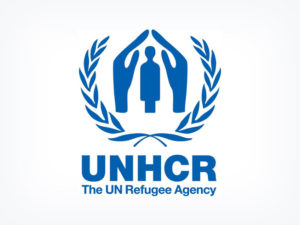UNHCR And Syria’s Refugee Hosting Neighbours Push For International Support
With two million refugees having fled Syria, government ministers from Iraq, Jordan, Lebanon, and Turkey announced with UNHCR today that they had agreed to jointly seek an urgent and major expansion of international help for the region. Lebanon’s Minister of Social Affairs Wael Abu Faour, Jordan’s Foreign Minister Nasser Judeh, Turkey’s Foreign Minister Ahmet Davuto?lu and Iraqi Foreign Minister Hoshyar Zebari, joined High Commissioner for Refugees Antonio Guterres in expressing serious concern about the deteriorating humanitarian situation in the region, and the devastating impact this is having on countries hosting large Syrian refugee populations. In an agreed statement, the High Commissioner and the Ministers said, “We are facing the dramatic escalation of the Syrian conflict, namely with the use of chemical weapons. We strongly appeal to the international community to overcome existing differences and come together to stop the fighting. All actions that are creating refugee flows need to cease. A political solution to end this cycle of horror is urgently needed. There is no humanitarian solution to the Syrian crisis; rather there needs to be a political solution that ends the humanitarian crisis.” Wednesday’s agreement now paves the way for a High-Level Segment at ministerial level to be held on September 30 as part of UNHCR’s annual Executive Committee gathering. Those discussions will seek to build consensus for large-scale commitments incorporating humanitarian and emergency development support. This would include the involvement of international financial institutions. Based on numbers of refugees who have registered or are pending registration, Syria’s neighbours are today hosting more than two million Syrian refugees, compounding already growing strains on their structures and economies. Some 720,000 of these refugees are in Lebanon, 520,000 in Jordan, 464,000 in Turkey and 200,000 in Iraq. Egypt is hosting an additional 111,000 Syrian refugees. The real figures are believed to be higher still as not all people register with UNHCR. The impact on these countries has been profound: In Lebanon, the economic and social repercussions with over one million Syrians present are devastating and create huge pressures on the local populations. The number of Syrians currently registered as refugees or pending registration is equal to more than 18 per cent of the country’s population, with groups of refugees scattered across 1,400 localities. The impact is alarming, particularly on the delicate demographic structures, with serious security implications. Health, education, and water and sanitation systems have all exceeded their capacities. In Jordan, despite limited resources, a strained economy and overstretched services and infrastructure, the Syrian refugee influx has swollen the population size by 11 per cent, with 140,000 in camps. the overwhelming majority (480,000) of Syrians are in Jordanian cities and villages. This increase has constituted an enormous pressure on Jordanian resources, services and infrastructure and it must be kept in mind that a sudden increase in a population by 11 per cent constitutes a serious security threat for any country. The cost of hosting refugees in 2013 solely in relation to electricity, water, education, health, municipalities, subsidised goods, and protection and reception, has now reached $2.016 billion. In Iraq, already contending with security problems and large-scale internal displacement of around one million people before the Syria crisis began, the 160,000-strong Syrian refugee population has been swollen further by the recent influx of more than 40,000 people from areas of conflict in north and northeast Syria. As well as those in camps, thousands of these refugees are living among the local population in situations that will become economically unsustainable without more help. In Turkey, the government has responded to the Syrian refugee influx with US$2 billion in support. Refugees are spread across 21 camps where they receive shelter, health care, security and other services. Almost a quarter of a million Syrians are already documented living outside of camps in urban locations, with many more pending registration. UNHCR’s Executive Committee meeting on 30 September will bring together ministerial delegations from UN member states, heads of UN agencies and development actors, as well as international financial institutions and NGOs. Planning for the humanitarian aspects of the Syria situation has to date been done on the basis of periodically updated inter-agency response plans the most recent iteration of which was a $4.4 billion appeal launched in June, some $3 billion of which was to meet humanitarian and host community needs this year in the immediate surrounding region. As of end August, the component of this appeal that deals with the surrounding region was approximately 40 per cent funded.







